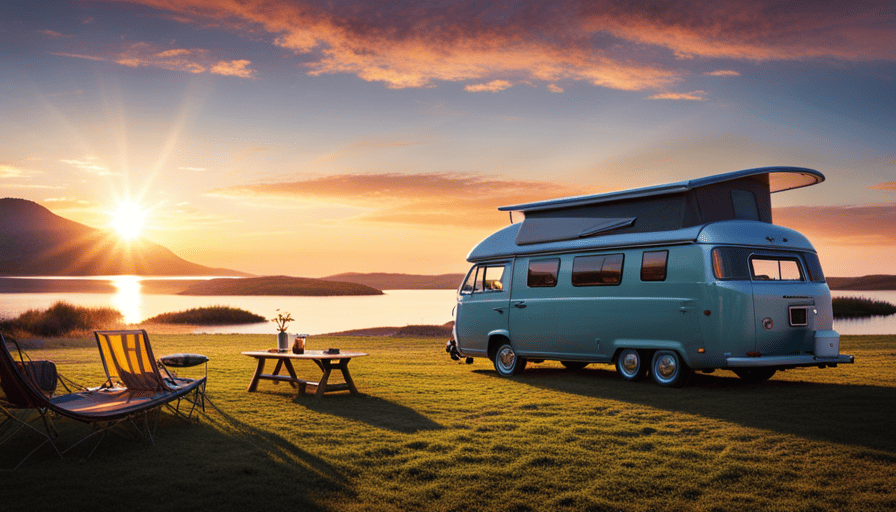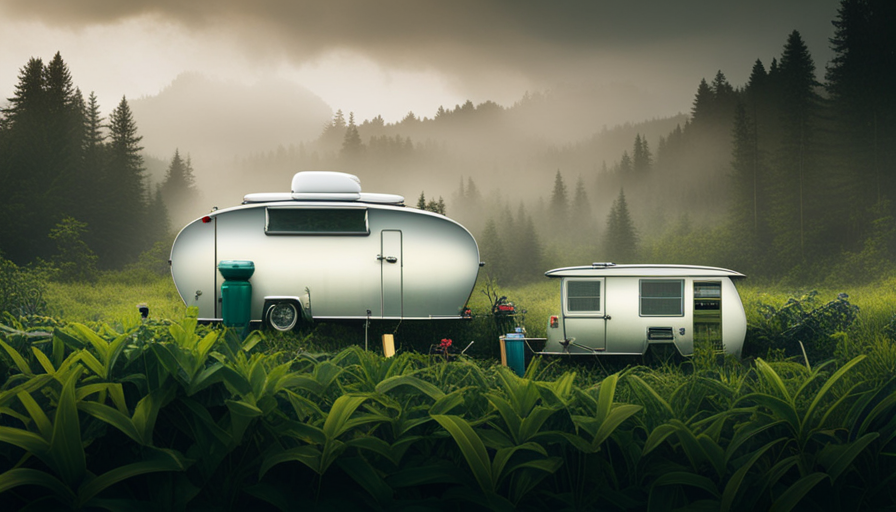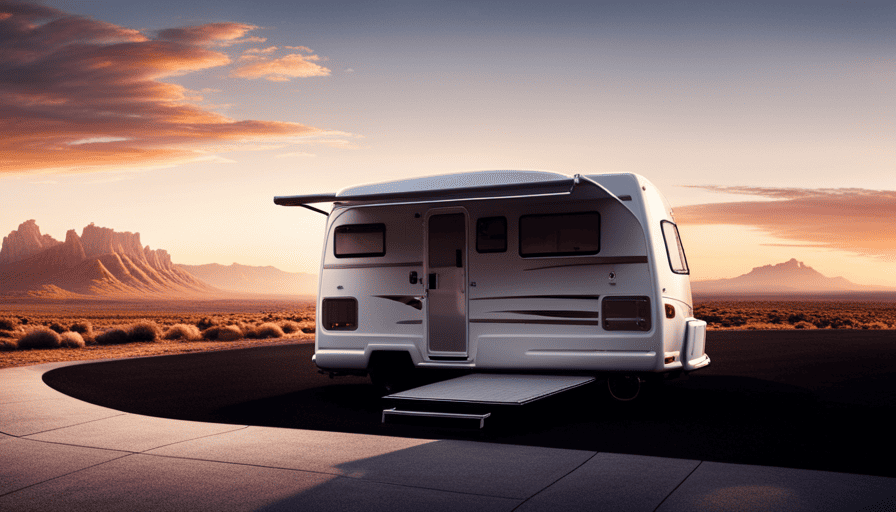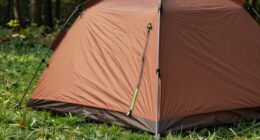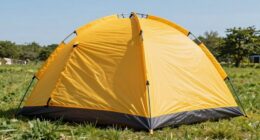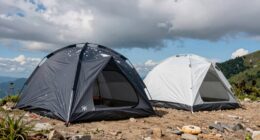Have you ever dreamed of hitting the open road, discovering the expansive wilderness, and savoring the freeing feeling of camping? Well, fellow adventurers, I have a theory that I believe will ignite a spark of excitement in you.
Picture this: a cozy camper, perfectly tailored to fit your truck, serving as your home away from home as you embark on unforgettable journeys.
In this article, we will delve into the world of campers and explore the question that has been on every outdoor enthusiast’s mind: what camper fits my truck? We will guide you through the process of finding the ideal camper that not only matches your truck’s specifications but also meets your camping needs and budget.
Drawing from our own experiences and the expertise of seasoned campers, we will share valuable insights on different camper types, compatible brands, additional features, and accessories to consider. By the end, you will be equipped with the knowledge to make an informed decision and set off on your next adventure with confidence.
So, buckle up and get ready to discover the perfect camper that will turn your truck into the ultimate mobile oasis. The open road awaits!
Key Takeaways
- Consider the size and weight of the camper to ensure compatibility with the truck’s payload and towing capacity.
- Assess the truck’s bed length and camper dimensions to ensure a comfortable and stable fit.
- Research and consult professionals to find camper brands that are specifically designed for the truck’s make, model, and specifications.
- Take into account the camping location, terrain, and duration of trips to choose a camper with the appropriate features and amenities.
Types of Campers Available
There are various types of campers that are readily available for your truck. When it comes to camper sizes, you have a range of options to choose from.
There are small campers, also known as truck bed campers, which are compact and lightweight. These campers are perfect for solo travelers or couples who are looking for a cozy and convenient camping experience.
On the other end of the spectrum, there are large campers that provide ample space and amenities for a family or a group of friends. These campers often come with multiple bedrooms, a kitchen, a bathroom, and even a living area.
In addition to the different sizes, campers also come with various features that can enhance your camping experience. Some campers are equipped with off-road capabilities, allowing you to venture into more remote and rugged terrains. Others have slide-outs, which can expand the living space when the camper is parked. You can also find campers with solar panels, generators, and other eco-friendly features for a sustainable camping experience.
When choosing a camper for your truck, it is important to consider your truck’s specifications. This includes factors such as the payload capacity, towing capacity, and bed length. By taking these specifications into account, you can ensure that the camper you choose is compatible with your truck and can be safely and effectively transported.
Consider Your Truck’s Specifications
When considering which camper will fit my truck, it’s important to take into account my truck’s specifications.
Three key points to consider are the payload capacity, towing capacity, and bed length. The payload capacity refers to the weight that my truck can safely carry, while the towing capacity indicates the maximum weight that my truck can tow.
Additionally, the bed length of my truck will determine the size of camper that will fit securely.
By understanding these specifications, I can ensure that I choose a camper that’s compatible with my truck and meets my needs.
Payload Capacity
To determine which camper fits your truck, you’ll want to consider its payload capacity, which refers to the maximum weight it can safely carry. The truck’s suspension plays a crucial role in this aspect, as it needs to be able to handle the additional weight of the camper without compromising its performance or stability.
When evaluating your truck’s payload capacity, keep in mind the following:
-
Consult your truck’s owner’s manual or contact the manufacturer to obtain the specific payload capacity for your model.
-
Consider the weight of any additional accessories or modifications you’ve added to your truck, as these will contribute to the overall payload.
-
Take into account the weight distribution of the camper, ensuring that it’s evenly distributed across the truck’s axles to maintain proper balance.
-
Remember to factor in the weight of any passengers or cargo that’ll be inside the truck while towing the camper.
Considering these factors will help you determine the appropriate camper size and weight for your truck’s payload capacity.
Moving on to the next section, let’s discuss the truck’s towing capacity and how it relates to choosing the right camper.
Towing Capacity
Determining the right camper for your truck involves considering its towing capacity and how it affects your choice. Towing capacity refers to the maximum weight that your truck can safely tow. It is crucial to know the towing capacity of your truck before selecting a camper, as exceeding this limit can lead to serious safety issues.
Additionally, weight distribution plays a significant role in towing. Proper weight distribution ensures stability and control while on the road. When choosing a camper, you need to consider not only the weight of the camper itself but also the weight of your cargo and any additional equipment you may be carrying.
By understanding your truck’s towing capacity and considering weight distribution, you can make an informed decision on the camper that best suits your needs.
Now let’s move on to discussing bed length.
Bed Length
Bed length becomes a crucial consideration when selecting the perfect match for your pickup. The length of your truck bed will determine the size and type of camper that can comfortably fit on your vehicle. Here are three key points to help you understand the importance of bed length:
-
Truck bed dimensions: Measure the length of your truck bed to determine the maximum size of camper that can be accommodated. Different truck models have varying bed lengths, so it’s essential to know the exact measurements of your truck bed.
-
Camper weight restrictions: Consider the weight restrictions of your truck when selecting a camper. Ensure that the camper you choose falls within the weight limits specified by the manufacturer to avoid any potential safety issues.
-
Compatibility: Match the camper’s dimensions and weight to your truck bed’s specifications. A camper that is too large or heavy for your truck can affect its stability and performance on the road.
Considering these factors will help you find the camper that perfectly fits your truck. Now, let’s move on to determining your camping needs.
Determine Your Camping Needs
Considering our camping needs, it’s crucial to identify the camper that perfectly complements our truck. To determine the camper that is best suited for our adventures, we must first consider our camping location and the duration of our trips.
When it comes to camping location, we need to think about the type of terrain we will be exploring. If we plan on venturing off-road or camping in rugged environments, a camper with off-road capabilities and sturdy construction would be ideal. On the other hand, if we prefer camping in established campgrounds or parks, a camper with more amenities and comfort features may be a better fit.
Next, we need to consider the duration of our camping trips. If we enjoy quick weekend getaways, a smaller camper with basic facilities might suffice. However, if we plan on embarking on extended adventures or full-time RV living, a larger camper with more living space and storage options would be necessary.
By evaluating our camping location and duration, we can determine the camper that will meet our specific needs. With this knowledge in mind, we can now transition into researching compatible camper brands to find the perfect fit for our truck.
Research Compatible Camper Brands
Once you hit the road, it’s time to dive deep into the world of camper brands and find the one that aligns perfectly with your truck, unlocking a whole new world of adventure. Researching camper compatibility is crucial in ensuring that you find the right camper for your truck.
Start by identifying the make, model, and specifications of your truck, including its payload capacity and towing capabilities. This information will serve as your guide when exploring different camper brands.
When researching compatible camper brands, consider factors such as weight, size, and design. Look for campers that are specifically designed to fit your truck’s dimensions and weight limits. Narrow down your options by reading reviews, visiting manufacturer websites, and joining online forums where fellow truck owners share their experiences with different camper brands. Pay attention to any potential compatibility issues or recommendations from other truck owners.
It’s also helpful to consult with experts or dealers who specialize in campers for trucks. They have extensive knowledge and experience in matching campers with trucks and can provide valuable insights and recommendations based on your specific needs.
By thoroughly researching and considering different camper brands, you’ll be able to find the perfect fit for your truck and embark on unforgettable adventures.
Consult with Experts or Dealers
When it comes to finding the perfect camper for your truck, visiting local RV dealerships is a crucial step. These knowledgeable professionals can help you narrow down your options and find a camper that is compatible with your truck’s specifications.
Additionally, talking to experienced campers can provide valuable insights and recommendations based on their own experiences.
Lastly, seeking professional advice, whether it be from mechanics or truck experts, can ensure that you make an informed decision and avoid any potential compatibility issues.
Visit Local RV Dealerships
To find the perfect camper for our truck, we should explore nearby RV dealerships. Visiting different RV dealerships allows us to see and compare various camper options. Here are three reasons why this is a valuable step in our search:
-
Wide Selection: RV dealerships offer a wide range of campers, from compact trailers to luxurious motorhomes. Exploring these options gives us a better understanding of what’s available and what suits our needs.
-
Expert Guidance: Dealership staff are knowledgeable and experienced in matching campers to trucks. They can provide valuable insights and recommendations based on our specific requirements.
-
Hands-on Experience: Being able to physically see and step inside different campers is crucial. It allows us to assess the layout, storage space, and overall comfort. This firsthand experience helps us make an informed decision.
By visiting local RV dealerships, we can gather valuable information and get a feel for what camper will fit our truck. Transitioning into the next step, let’s talk to experienced campers for further advice.
Talk to Experienced Campers
Chatting with seasoned campers is like tapping into a treasure trove of wisdom and expertise when it comes to finding the perfect match for our trusty vehicle. These experienced campers have tried out different types of campers and can share their firsthand experiences. They can provide valuable insights into which camper types are suitable for different trucks, considering factors like size, weight, and towing capacity.
They may also offer tips on what to look for when choosing the right camper, such as considering the number of sleeping areas, kitchen facilities, and storage options. Their knowledge can help us avoid common pitfalls and make informed decisions.
Seeking professional advice is the next logical step, as experts can provide additional guidance in narrowing down the options and ensuring a camper that perfectly complements our truck.
Seek Professional Advice
After talking to experienced campers and gathering their insights, we realized that seeking professional advice is a crucial step in finding the perfect camper for your truck.
While experienced campers can provide valuable information based on their own experiences, professional guidance offers a level of expertise and knowledge that is unparalleled. Professionals are well-versed in the different types of campers available in the market, and they can help you narrow down your options based on your specific needs, budget, and truck specifications.
Additionally, they can offer advice on weight distribution, towing capacity, and other technical aspects that are essential for a safe and comfortable camping experience. Seeking professional advice not only ensures that you make an informed decision, but it also saves you time and potential headaches down the road.
With their guidance, you can confidently move on to the next step: taking measurements and assessing fit.
Take Measurements and Assess Fit
First things first, let’s measure your truck and assess which camper will be the perfect fit. Taking accurate measurements is crucial to ensure camper compatibility. Start by measuring the length, width, and height of your truck bed. Measure from the inside of the bed, taking into account any wheel wells or other obstructions. Additionally, measure the distance between the cab and the end of the bed, as this will determine the maximum length of the camper that can be accommodated.
Next, consider the weight capacity of your truck. Check the manufacturer’s specifications for the maximum payload capacity, which includes the weight of the camper along with any additional gear or supplies you plan to carry. It’s important to choose a camper that falls within your truck’s weight limits to ensure safe and efficient towing.
Once you have all the measurements and weight capacity information, you can start looking for campers that match your truck’s specifications. Keep in mind that different campers have varying floor plans, features, and sizes. Consider your camping needs and preferences to find the best fit for you.
Now that you have assessed which camper will fit your truck, it’s time to consider your budget. Transitioning into the next section, it’s important to find a camper that not only fits your truck but also aligns with your financial resources.
Consider Your Budget
When considering your budget, it’s crucial to evaluate the financial resources at your disposal to ensure you find a camper that not only suits your truck but also aligns with your monetary constraints. Budget considerations play a significant role in determining the type of camper you can afford.
Take into account not just the initial purchase cost but also ongoing expenses such as maintenance, insurance, and fuel consumption. It’s important to strike a balance between your desired features and your financial capabilities.
To help manage your budget, explore financing options that may be available to you. Many dealerships offer financing plans with flexible payment terms, allowing you to spread out the cost of the camper over time. Consider the interest rates, monthly payments, and the total amount you will pay in the long run.
By carefully assessing your budget and exploring financing options, you can make an informed decision about which camper is the best fit for your truck and your wallet. Once you have a clear understanding of your financial boundaries, you can move on to the next step of test driving and inspecting campers, ensuring you find the perfect match for your needs.
Test Drive and Inspect Campers
Before hitting the road with your potential dream home on wheels, take a spin and give these campers a thorough once-over to ensure they’re as perfect as finding a unicorn in a field of rainbows. Testing out a camper before making a purchase is crucial to ensure it meets your needs and expectations.
Here are some benefits of a test drive and an inspection checklist to guide you:
- Test Drive Benefits:
- Evaluate driving experience: Get a feel for how the camper handles on the road, including acceleration, braking, and maneuverability.
- Assess comfort and space: Check if the seating, sleeping areas, and amenities are comfortable and spacious enough for your needs.
- Test electrical systems: Verify that all lights, appliances, and outlets are in working order.
- Check for noise and vibrations: Pay attention to any unusual sounds or vibrations while driving, as they may indicate mechanical issues.
- Determine fuel efficiency: Test the camper’s fuel consumption to understand its efficiency and estimate costs.
Camper Inspection Checklist:
- Exterior: Inspect the body, windows, roof, and awnings for any signs of damage or leaks.
- Interior: Check for any signs of water damage, mold, or pests.
- Appliances: Test all appliances, including the stove, refrigerator, air conditioner, heater, and water pump.
- Plumbing and electrical systems: Run water through all faucets and check the electrical outlets for functionality.
- Safety features: Ensure that smoke and carbon monoxide detectors, fire extinguishers, and emergency exits are present and functional.
Before considering additional features and accessories, it’s essential to thoroughly evaluate the camper’s condition and performance.
Consider Additional Features and Accessories
Now that you’ve test-driven and inspected your potential dream home on wheels, it’s time to explore the world of additional features and accessories to enhance your camper experience.
When considering additional features, such as slide outs and awnings, it’s important to think about how they’ll improve your overall comfort and convenience. Slide outs are a fantastic addition as they create extra living space inside the camper, giving you more room to relax and enjoy your surroundings.
Awnings, on the other hand, provide shade and protection from the elements, allowing you to enjoy the outdoors even on hot and sunny days.
In addition to features, accessories can also greatly enhance your camper experience. Consider accessories, such as bike racks and roof racks, which allow you to bring along your favorite outdoor equipment. With a bike rack, you can easily transport your bikes and explore scenic trails wherever you go. A roof rack provides additional storage space for items like kayaks or surfboards, enabling you to engage in exciting water activities during your camping trips.
By considering these additional features and accessories, you can truly customize your camper to fit your specific needs and interests.
Now that you have all the information you need, you can make an informed decision about which camper is the perfect match for your truck and camping lifestyle.
Make an Informed Decision
When it comes to making an informed decision about choosing the right camper for your truck, it’s important to compare the pros and cons of each option.
This allows you to weigh the advantages and disadvantages of different features and accessories, helping you narrow down your choices.
Once you have considered all the factors and made your final choice, you can look forward to enjoying your camping adventures with confidence, knowing that you have selected the perfect fit for your truck.
Compare Pros and Cons
Although there are advantages and disadvantages to consider, finding the perfect camper for your truck is like embarking on an exciting journey with breathtaking views and unexpected obstacles along the way.
When comparing camper sizes, it’s important to evaluate the build quality as well. Larger campers offer more space and amenities, while smaller ones are more maneuverable and fuel-efficient. However, larger campers may be harder to park and drive in tight spaces.
Additionally, build quality is crucial to ensure durability and longevity. Some campers may have better construction materials and techniques, resulting in a sturdier and more reliable unit.
As you weigh the pros and cons of different camper sizes and build qualities, you’ll be able to make an informed decision and finalize your choice without any doubts.
Finalize Your Choice
Making a decision without any doubts is like reaching the summit of a mountain after a challenging climb. When it comes to finalizing your choice for a camper that fits your truck, it’s important to ensure that you have considered all the necessary factors.
Consulting professionals and exploring different options can help you make an informed decision. To make the process more enjoyable and relatable, here are four key points to consider:
-
Size and weight: Determine the maximum size and weight your truck can handle to find a camper that is compatible.
-
Features and amenities: Consider the amenities you desire, such as a kitchenette, bathroom, or sleeping capacity, to find a camper that suits your preferences.
-
Durability and construction: Look for campers made with high-quality materials and sturdy construction to ensure longevity.
-
Budget: Set a budget and compare prices to find a camper that offers the best value for your money.
By considering these factors, you can confidently choose the camper that best suits your truck and camping needs. So, get ready to enjoy your camping adventures!
Enjoy Your Camping Adventures!
After finalizing your choice of camper for your truck, it’s time to hit the road and enjoy your camping adventures!
As seasoned campers, we understand the importance of having the right camping essentials and following a few tips for a successful trip. Firstly, make sure to pack the basics such as a tent, sleeping bags, cooking equipment, and enough food and water for your stay.
Additionally, don’t forget to bring a first aid kit, insect repellent, and extra clothes for unpredictable weather.
When setting up camp, choose a flat and level spot, and be mindful of any potential hazards like tree branches or rocky terrain.
Lastly, remember to leave no trace by properly disposing of your waste and respecting the environment.
By following these tips, you can ensure a memorable and enjoyable camping experience for everyone involved.
Happy camping!
Frequently Asked Questions
How much weight can my truck safely carry with a camper attached?
To calculate the payload capacity of a truck with a camper attached, there are a few factors to consider. First, you should determine the Gross Vehicle Weight Rating (GVWR) of your truck, which is the maximum weight it can safely carry.
Next, subtract the weight of the camper from the GVWR to find the remaining payload capacity. It’s important to also consider the weight distribution and stability of your truck when determining the weight capacity.
Are there any specific camper brands that are known to be more compatible with certain truck models?
When it comes to camper compatibility and matching the right truck with the right camper, there are indeed specific brands known to be more compatible with certain truck models.
For example, the Ford F-150 is often considered a great match for the Airstream Basecamp due to its towing capacity and stability.
It’s important to research and consider factors such as weight, dimensions, and towing capabilities to ensure a safe and seamless pairing between your truck and camper.
Can I install a camper on a truck with a shorter bed length?
Yes, it’s possible to install a camper on a truck with a shorter bed length. However, it’s important to consider the weight capacity of the camper and make sure it’s compatible with the truck’s bed size. You’ll need to find a camper specifically designed for shorter truck beds and has a weight capacity that matches or is below your truck’s specifications. It’s always recommended to consult with a professional to ensure a proper fit and safe installation.
What are the pros and cons of a pop-up camper versus a hard-sided camper?
When it comes to choosing between a pop-up camper and a hard-sided camper, there are pros and cons to consider.
A pop-up camper offers the flexibility of easy towing and compact storage, perfect for adventurous road trips.
On the other hand, a hard-sided camper provides greater durability and insulation, making it ideal for harsh weather conditions.
It ultimately depends on your camping style and preferences. Both options have their own unique advantages and disadvantages.
Are there any special permits or licenses required to drive a truck with a camper attached?
To drive a truck with a camper attached, there are some special requirements to consider. Depending on the weight and size of the camper, you may need a special permit or license.
It’s crucial to check your local regulations as they vary by state. Additionally, you’ll want to ensure you have insurance coverage for the camper attachment. Contact your insurance provider to discuss any necessary adjustments to your policy to protect your investment on the road.
Conclusion
After carefully considering our truck’s specifications and camping needs, researching compatible camper brands, consulting with experts and dealers, and test driving and inspecting various campers, we were able to make an informed decision.
Just like a puzzle piece that perfectly fits into place, we found the camper that perfectly fits our truck, allowing us to embark on countless adventures and create lasting memories.
With the additional features and accessories that we chose, our camper is like a well-equipped fortress on wheels, ready to take on any camping challenge.


